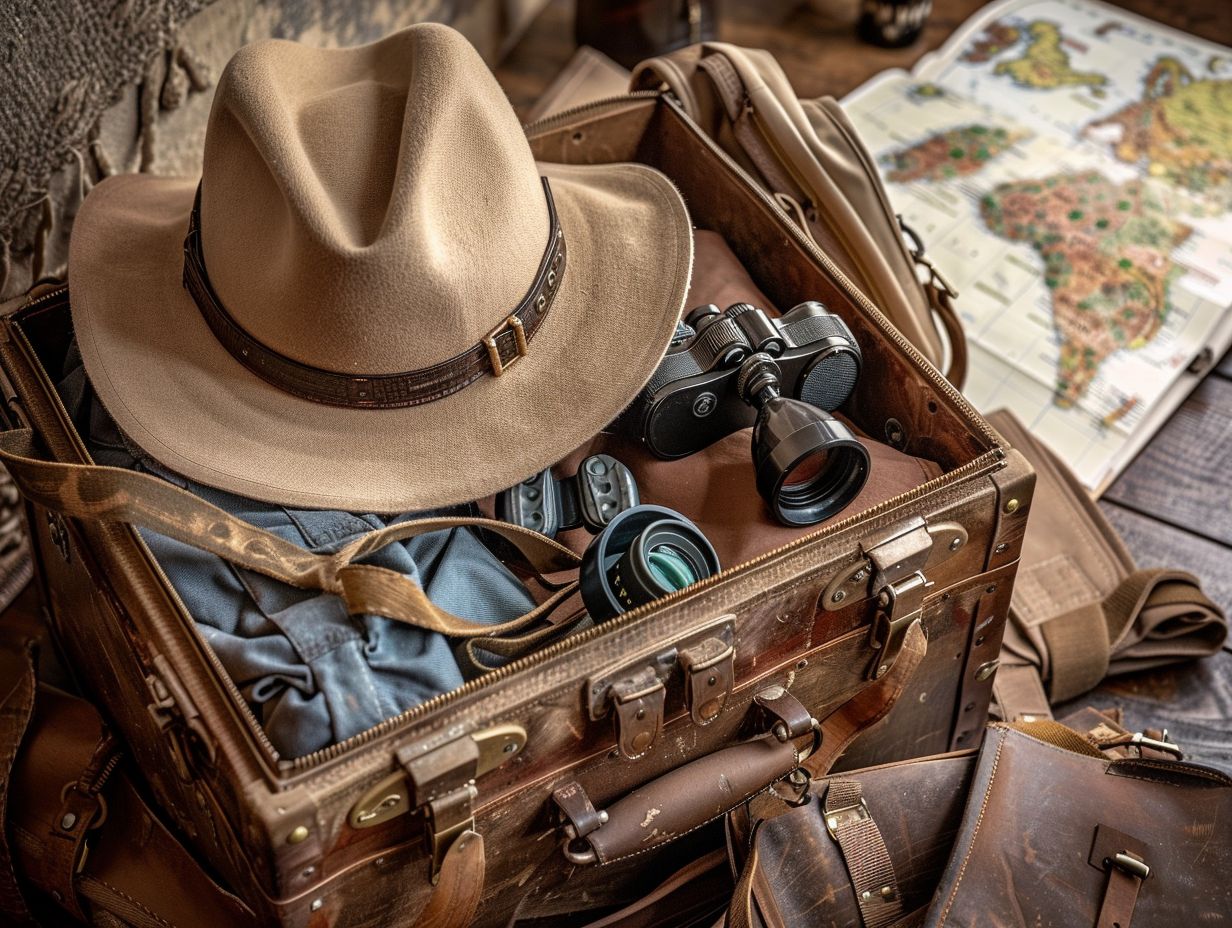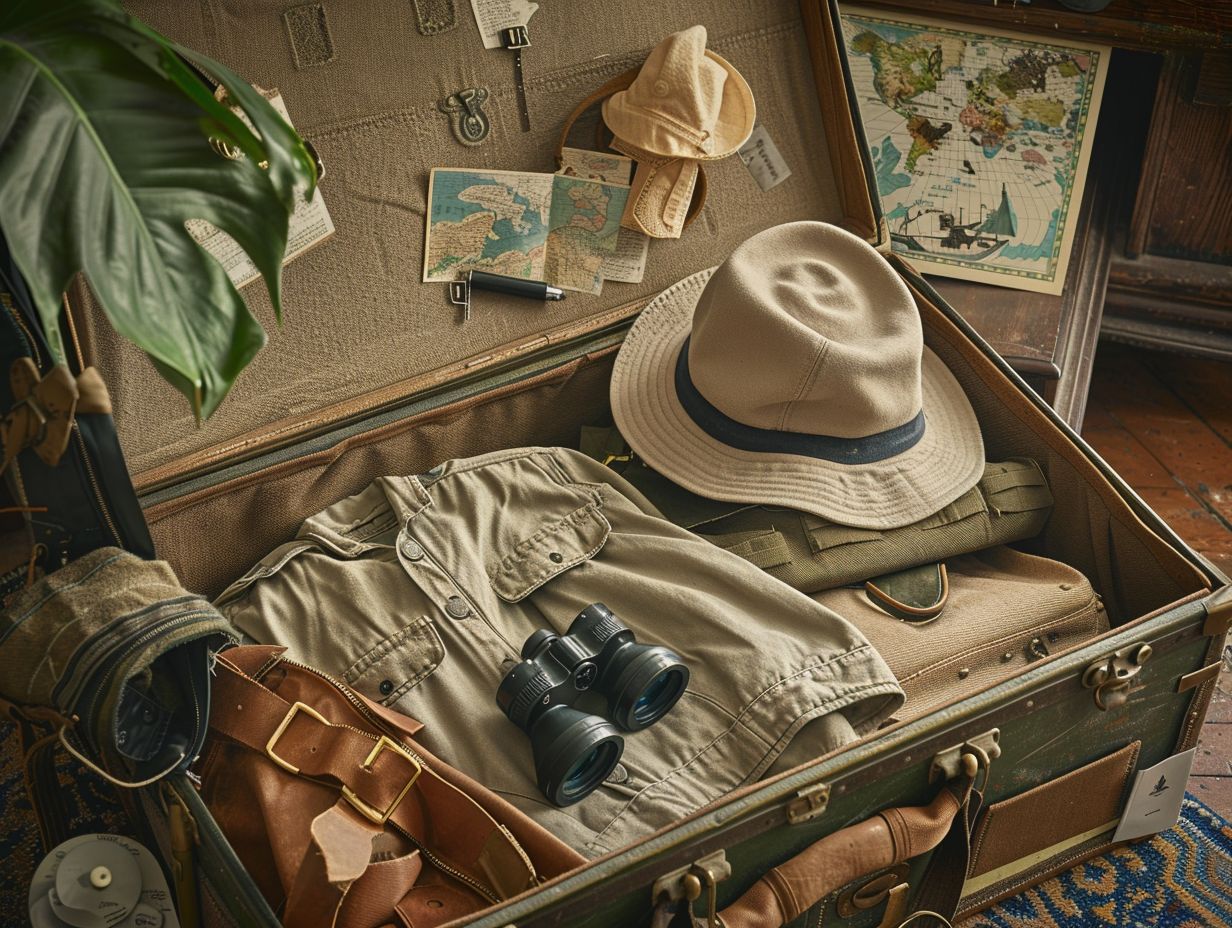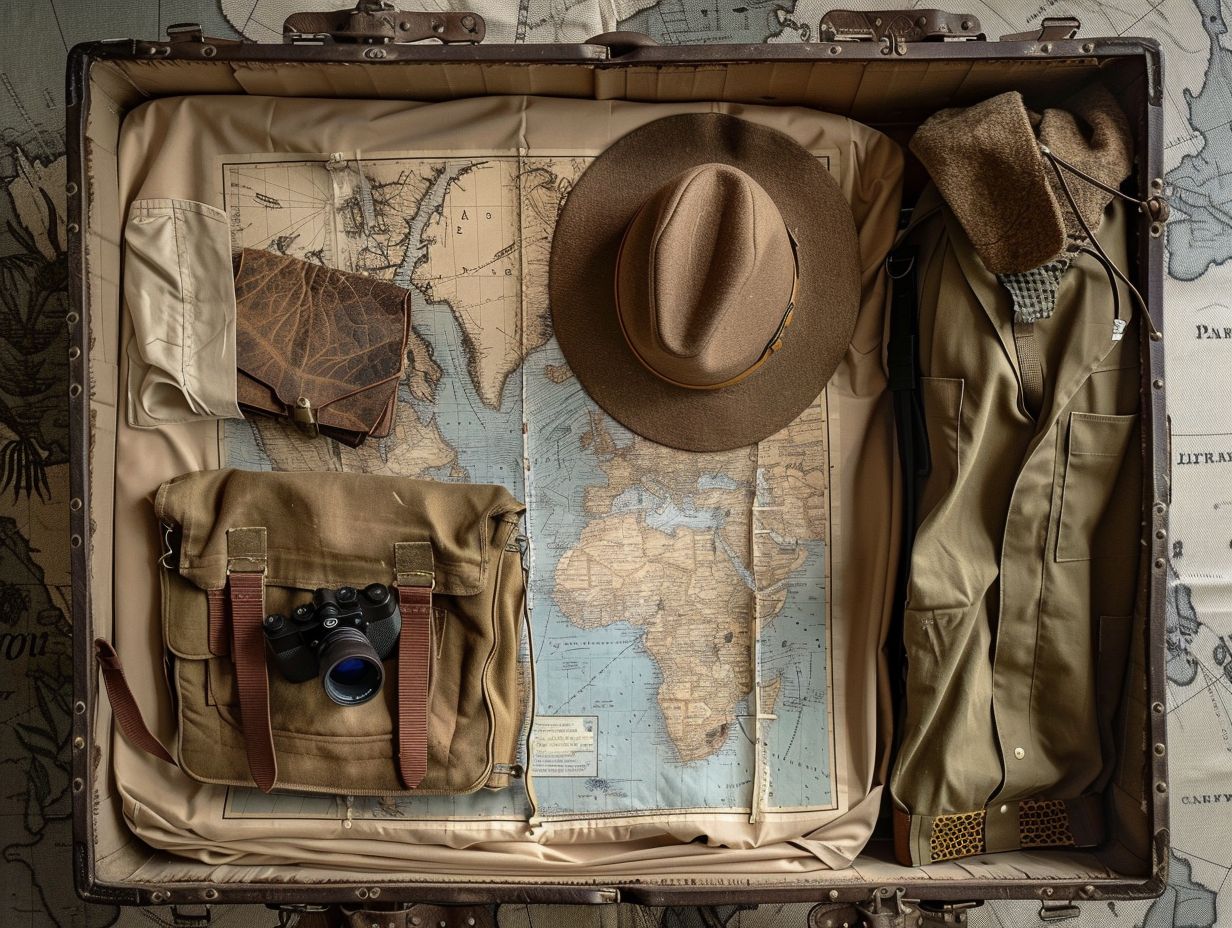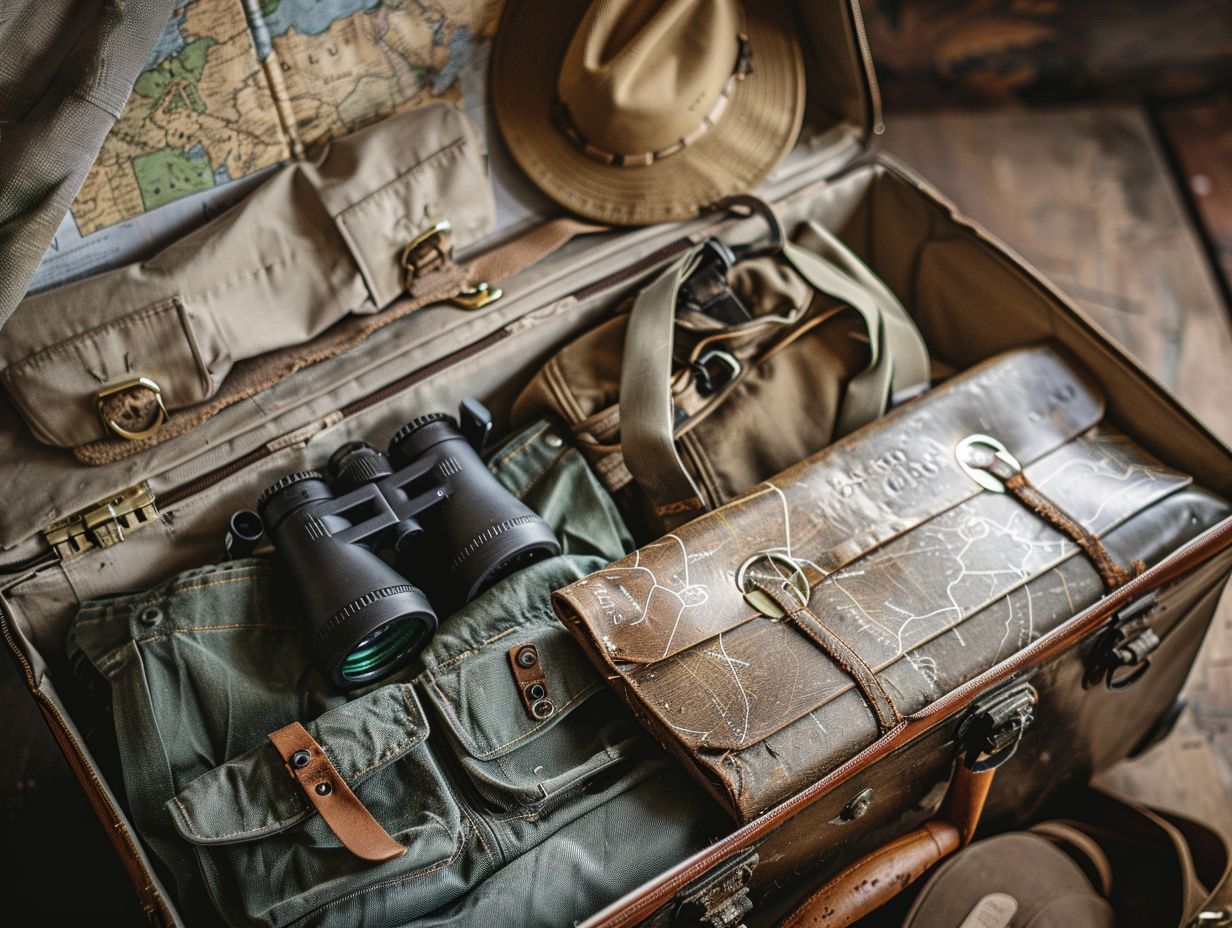
Safari Packing List
Heading off on a safari adventure soon? Packing can be overwhelming, but don’t worry, we’ve got you covered with our comprehensive safari packing list.
From essential clothing items to must-have gear, important documents, and other essentials, we’ll make sure you’re well-prepared for your safari experience.
Whether you’re wondering what kind of clothes to pack, what camera equipment to bring, or what medications to have on hand, we’ve got all the tips and advice you need to ensure a successful safari trip.
Let’s get started!
Key Takeaways:

- Pack light and versatile clothing made of breathable and neutral-colored fabrics.
- Bring a quality camera and essential gear for capturing wildlife and the safari experience.
- Remember to bring important documents, necessary medications, basic toiletries, snacks and drinks, and comfortable and sturdy shoes.
What to Pack for a Safari?
When preparing for an African safari adventure, it’s crucial to pack the right safari clothing, supplies, luggage, and necessary tech to ensure a comfortable and successful trip.
Having the appropriate clothing for an African safari can make all the difference in your experience. Opt for lightweight, breathable clothing in neutral tones to blend in with the natural surroundings and help regulate body temperature. Don’t forget to pack sturdy hiking boots, a wide-brimmed hat for sun protection, and sunglasses.
Regarding supplies, items like a high-quality camera with zoom lens, a refillable water bottle, and insect repellent are essential. An efficient packing strategy and choosing the right size and type of luggage can also simplify your journey.
Essential Clothing Items for a Safari:
Selecting the appropriate safari clothing is essential for a successful African safari. The right garments can ensure comfort and protection against varying weather conditions while blending in with the natural surroundings.
-
What Kind of Clothes Should You Pack?
When packing for an African safari, opt for lightweight, breathable, and neutral-colored safari clothing that provides comfort and camouflage while ensuring protection against the elements and wildlife encounters.
Popular choices for safari clothing include convertible pants to shorts, moisture-wicking shirts to keep you cool, wide-brimmed hats for sun protection, and sturdy hiking boots for trekking through diverse terrains.
- Incorporating quick-drying fabrics is key to staying dry in unpredictable weather conditions.
- Opting for long-sleeved shirts and long pants helps protect against sunburn and insect bites.
Accessorize with a lightweight scarf or bandana to shield your neck from the sun, and don’t forget to pack a waterproof jacket for sudden rain showers.
-
What Are the Best Fabrics for a Safari?
For an African safari, choose clothing made from moisture-wicking fabrics like cotton, linen, or synthetic blends that offer breathability, quick-drying properties, and comfort in varying weather conditions.
While cotton is a classic choice due to its soft, breathable nature, it may not be the best option for intense trekking or hot climates as it tends to retain moisture.
Opt for linen if you prefer a lightweight and airy feel, perfect for sunny days.
Synthetic blends like polyester or nylon are excellent for their quick-drying abilities, making them ideal for sudden rain showers or sweaty hikes. These materials also provide durability and are easy to pack, making them convenient for travel.
-
What to Wear on a Safari Game Drive?
When embarking on a safari game drive, wear light layers, long sleeves, and pants to protect against sun exposure and potential insect bites. Consult with your tour operator for specific clothing recommendations based on the safari destination and weather conditions.
It is crucial to opt for breathable fabrics like cotton or moisture-wicking materials to stay comfortable in the heat and humidity during the game drive. Wide-brimmed hats and sunglasses are essential for shielding your face and eyes from the harsh sun, while closed-toe shoes are recommended to prevent any injuries from thorns or uneven terrain.
- Consider packing a lightweight, waterproof jacket in case of sudden changes in weather, especially for safaris in regions prone to rainfall. An effective insect repellent with DEET can help ward off mosquitoes and other pests, minimizing the risk of insect-borne diseases.
- Remember to tuck pants into socks to prevent creepy-crawlies from entering your clothing, and always carry a small backpack to store personal essentials such as sunscreen, water, and camera equipment.
Must-Have Gear for a Safari:

Plus clothing, having essential gear such as binoculars, camera equipment, and other safari supplies is crucial for maximizing your wildlife viewing experiences and capturing memorable moments on your African safari.
Binoculars are a must-have when you’re out on a safari, as they allow you to observe animals in their natural habitat from a safe distance. A good pair with high magnification can bring distant creatures up close, adding an extra layer of excitement to your adventure.
Camera equipment, like a DSLR or a high-quality lens, is essential for capturing those breathtaking shots of wildlife. Investing in a sturdy tripod can also help achieve steady shots, especially in low-light conditions.
Other supplies such as a field guide, sunscreen, and binocular harness can further enhance your safari experience.
-
What Camera Equipment Should You Bring?
When preparing for an African safari, ensure you pack a high-quality camera, lenses suitable for wildlife photography, memory cards, and batteries to capture the stunning landscapes and wildlife encounters. Consult with safari experts for specific recommendations on camera gear based on your safari itinerary and photography preferences.
One of the most crucial aspects to consider when selecting a camera for your safari adventure is the ability to capture fast-moving wildlife with clarity and precision. Opt for a camera with high-resolution capabilities and fast autofocus to ensure you don’t miss any crucial moments.
- Telephoto lenses are a must for wildlife photography on safari, allowing you to capture distant subjects with intricate detail. Consider a lens with a long focal length, such as 300mm or 400mm, to bring animals up close in your photographs.
Remember to pack extra memory cards to support the sheer number of photos you’ll be taking in the African wilderness. Running out of storage space can be a photographer’s worst nightmare on safari.
-
What Other Gear is Essential for a Safari?
Apart from camera equipment, consider packing essential safari supplies such as a motion sickness relief band, insect repellent gel, and other gear to enhance your comfort, safety, and overall safari experience. These items can be invaluable during long drives or charter plane trips in African safari destinations.
When embarking on an African safari, the varied landscapes and modes of transport can put a strain on your body, making these additional supplies crucial for a smooth journey. The motion sickness relief bands can be a game-changer, especially during bumpy rides through the savannah.
Similarly, the insect repellent gel ensures you are protected from pesky bugs and potential insect bites, allowing you to fully enjoy your outdoor excursions without any interruptions. Other essentials like a compact first aid kit, a good quality water bottle, and a comfortable sun hat can also significantly contribute to your overall well-being and enjoyment during your safari adventure.
Important Documents and Medications:
Ensuring you have all necessary documents like e-Visa, along with essential medications such as malaria prophylaxis, motion sickness tablets, and a suitable travel adapter for your electronics is crucial for a smooth and hassle-free African safari experience.
Having the e-Visa readily available at immigration checkpoints will expedite your entry into different countries within Africa, ensuring you can enjoy more time exploring the diverse landscapes and wildlife.
Carrying medications for common health concerns like malaria is vital as prevention is key in such regions where these diseases are prevalent.
Motion sickness tablets can be a helpful remedy during bumpy game drives or flights between safari destinations, allowing you to fully immerse yourself in the safari experience without any discomfort.
Ensuring you have a compatible travel adapter for your electronics will enable you to keep your devices charged for capturing memorable moments and staying connected while on your safari adventure.
-
What Documents Do You Need for a Safari?
Before embarking on your African safari, ensure you have necessary documents like your e-Visa, travel itinerary, insurance details, and emergency contacts readily accessible. Consult with safari operators or charter plane services for any specific document requirements based on your destination.
Regarding e-Visas, make sure to apply well in advance to avoid any last-minute hassles. Your travel itinerary should include details about accommodations, flights, and activities to make your adventure seamless.
- Having comprehensive travel insurance is vital to protect yourself, your belongings, and your trip investment in case of unforeseen events.
Your emergency contacts should be easily reachable and well-informed about your travel plans. It is always wise to have both digital and physical copies of all these documents to be prepared for any situation that may arise during your African safari.
-
What Medications Should You Bring on a Safari?
When packing for an African safari, remember to bring essential medications such as malaria prophylaxis, motion sickness relief bands, and first-aid supplies to address common health concerns and ensure a safe and enjoyable travel experience in remote safari locations.
It is crucial to have a malaria prophylaxis regimen prescribed by a healthcare provider, as malaria is a prevalent risk in many safari destinations across Africa. Alongside, including over-the-counter medications for motion sickness like dramamine tablets or anti-nausea wristbands can help combat the winding roads and bumpy rides commonly experienced during game drives.
Packing a comprehensive first-aid kit containing items such as band-aids, antiseptic wipes, blister plasters, pain relievers, and antihistamines is vital for managing minor injuries, insect bites, allergies, and other unexpected health issues that may arise during the trip.
Other Essentials for a Safari:

Aside from clothing and gear, packing essential toiletries, snacks, suitable shoes, and sunscreen is essential for a comfortable and convenient African safari experience.
Having the right toiletries ensures that you can maintain personal hygiene in the often rugged conditions of the African wilderness. Snacks provide quick energy boosts between game drives or while exploring on foot. Appropriate footwear, such as sturdy hiking boots, offers support and protection over various terrains, reducing the risk of blisters or injuries.
Additionally, sunscreen shields your skin from the intense African sun, preventing sunburn and long-term skin damage. Including these items in your packing list is crucial for a smooth and enjoyable safari adventure.
-
What Toiletries Should You Pack?
When preparing for an African safari, include essential toiletries such as insect repellent, hand sanitizer, wet wipes, and stomach remedies like Pepto-Bismol to address hygiene, health, and comfort needs while exploring wildlife reserves and remote safari locations.
Ensuring you have a reliable and potent insect repellent is crucial for protecting yourself against mosquito bites and potential infections like malaria and dengue fever prevalent in certain regions of Africa.
A high-quality hand sanitizer becomes your best friend in areas where access to clean water is limited, allowing you to keep your hands germ-free after interactions with wildlife or before eating.
Wet wipes are handy for freshening up during dusty game drives or wiping off sunscreen residue, offering quick cleanliness on-the-go.
Packing stomach relief medications like Imodium AD can save you from potential gastrointestinal issues caused by dietary changes or contaminated water sources, ensuring that digestive discomfort doesn’t disrupt your safari adventure.
-
What Snacks and Drinks Should You Bring?
Carrying snacks like trail mix, energy bars, and hydration drinks in your safari luggage, along with necessary medications like Larium, ensures you stay energized, hydrated, and healthy during game drives and safari excursions in African wilderness areas.
When embarking on an African safari, it’s vital to pack these essentials to tackle the long hours spent in the wild. Trail mix provides a quick energy boost with its mix of nuts and dried fruits, while energy bars offer a convenient source of sustained energy. Hydration drinks are crucial to combat the hot and dry conditions, preventing dehydration during outdoor activities.
Medications like Larium can be a safety net against common travel illnesses, allowing you to fully immerse yourself in the safari experience without health concerns.
-
What Are the Best Shoes for a Safari?

Choosing the right footwear such as comfortable hiking boots, sandals, or trail runners is crucial for navigating diverse terrain and ensuring foot protection during safari activities. Consult with experts like Africa Adventure Company for shoe recommendations based on your safari itinerary and activities.
When considering footwear for an African safari, it’s essential to prioritize durability and comfort.
Comfortable hiking boots provide stability on rugged terrain, protecting your feet from sharp rocks and thorns.
Sandals are great for casual walks and hot weather, allowing your feet to breathe while exploring.
Trail runners offer a balance of support and flexibility, ideal for both hiking and walking safaris. Each type of footwear has its own advantages depending on the safari activities you plan to engage in.
-
What Other Items Should You Bring?
Plus essentials, consider carrying items like binoculars for wildlife viewing, sunscreen for sun protection, Airtags for luggage tracking, and other personalized items recommended by safari experts like Custom Safaris to enhance your safari experience and convenience.
Binoculars are essential for spotting wildlife from a distance, allowing you to observe animals in their natural habitat without disturbing them.
Sunscreen is crucial to protect your skin from the harsh African sun, ensuring you stay comfortable and safe during your safari adventure.
Airtags provide peace of mind by tracking your luggage, helping you keep track of your belongings in unfamiliar locations.
Custom Safaris may suggest specific items based on your itinerary and preferences, ensuring you have everything you need for a memorable safari experience.
Frequently Asked Questions:
1. What should I pack for a safari?
A: A safari packing list should include essential items such as comfortable and breathable clothing, closed-toe shoes, sun protection, insect repellent, a reusable water bottle, and a camera.
2. Do I need to bring any specific clothing for a safari?
A: It is recommended to pack neutral-colored, lightweight, and long-sleeved clothing for a safari. This type of clothing helps with sun protection and blends in with the natural environment to avoid startling animals.
3. Is it necessary to bring insect repellent on a safari?
A: Yes, insect repellent is a must-have on a safari as it helps protect against insect bites and potential diseases. Make sure to choose a repellent that is effective against the specific insects found in the safari location.
4. How should I protect myself from the sun on a safari?
A: Sun protection is crucial when on a safari. Make sure to pack a wide-brimmed hat, sunglasses, and sunscreen with a high SPF. Additionally, consider bringing a lightweight scarf or sarong to cover your shoulders and neck.
5. Can I wear sandals on a safari?
A: It is not recommended to wear sandals on a safari as they do not provide enough protection or support for walking in nature. Closed-toe shoes, such as hiking boots, are a better option for comfort and safety.
6. What type of camera should I bring on a safari?
A: A camera with a good zoom lens is ideal for capturing wildlife on a safari. Make sure to also bring spare batteries and memory cards to avoid missing out on any photo opportunities.